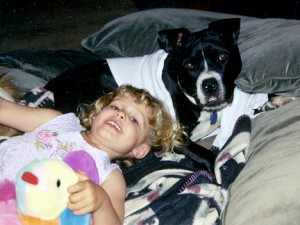September 28, 2010
People get married, have a kid or two, and feel it’s time to add a family dog. This is all natural and nothing is wrong with it, but there are many rescue groups that decline homes with kids under 5 years old.
Delaware Puppy Rescue cites on its website: “Until [7 years old] a child cannot reliably understand proper behavior around a dog. If you have a puppy that is very submissive, it is likely to get hurt. If you have a puppy that is less submissive, you stand the chance of a child getting nipped, and the dog being labeled a “biter” — often costing the animal its life … Both child and puppy are developmentally growing. Toddlers and young children tend to move unpredictably and run around, and puppies are inclined to chase them. Children often respond by shrieking and other high-pitched sounds. This leads the puppy to chase even more, and often nip as if playing with a littermate.”
Even a golden retriever rescue in Massachusetts has this caveat on its website: “Because of our emphasis on safety, we are very careful about the Goldens we will place into families with young children. Generally, we will not place the following types of Rescue Goldens into families with young children: Goldens who have had no exposure to children; Goldens who were given up because of characteristics that are incompatible with children. As a result, the number of Goldens available to go into these homes is low while the demand for them is high. Therefore we have found it necessary to decline applications from applicants with children 5 and under in the household. Repeat adopters will be considered on a case-by-case basis.”
As a rescue group, while we want to place as many dogs as possible, we’ve also told many families to come back when their toddlers become a few years older. When a family adopts a dog, every family member has to be on board and both parents have to be prepared to diligently work on adding a dog to their life because it is a huge commitment. Dogs are not wind-up toys for kids.
One parent goes to work, and the other is at home taking care of their babies, and there’s a new dog who needs and deserves a lot of attention and care. The worst is if they get a puppy. Puppies require as much work as a newborn. In fact, even without a kid, I really don’t wish to adopt a puppy.
Nonetheless, when people want a dog, they want a dog, and some families, when denied an adoption, then go to breeders, or worse — pet stores, and buy a dog (pet stores typically sell dogs from puppy mills). This is not good, not only because there are many dogs dying in the pound and they could have saved them, but also because they may eventually surrender the dog to the pound when they realize that it wasn’t the right time to add a dog to their life.
So, it’s important that the rescue groups help them realize when is the right time to adopt a dog, instead of merely denying their adoption. If they still want to adopt a dog, then the rescue group needs to give them the assistance they will need.
It’s all about education, because many of them are first-time dog guardians, and they simply don’t know what it entails to have a dog. While I have talked some families into waiting for a few years, there are always exceptions, and exceptions mean exceptions.
I placed a young, rambunctious but sweet pit bull to a family with a 2-year-old many years ago. They were experienced pit bull guardians, and were determined to adopt the breed. When the family met with the dog at her boarding kennel, she was very mouthy. The parents still wanted her. Under our instructions, they worked with a trainer on a regular basis. They put a backpack with weights on the dog and walked her over an hour every morning, rain or shine. This adoption worked and stuck only because the parents were committed and followed instructions to a T. It sounds simple, but it was a lot of work for them, which they said was worth it, however. It also helped that the child was mature for a 2-year-old and his parents kept him under control at all times.
Another example was a dog I was fostering myself. He was adopted to a home with a two-and-a-half year old, and the mother was expecting another baby in a few months. We usually advise that it’s not a good idea to adopt a dog while being pregnant because the pregnancy itself can be already stressful, and once the baby is born, she may not have enough time for the dog.
But this mother’s pregnancy was easy, and she explained that she and her husband wanted to adopt a dog while she could work with the new dog. I considered this adoption only because my foster dog had (still does) the temperament of a therapy dog; or more like a saint! We had many play dates, many talks, and made plans to make it work. I had him back while she was in hospital and remained as a backup home for him for a long time.
People need to know what they are getting into, so that they can make informed decisions. Many families were grateful when we talked them out of adopting a dog until their kids were older. Even if it feels like a waste of a home for an orphaned dog, it’s best if the dog goes to a home where he can receive care and the love he needs and deserves, rather than being forgotten in the back yard or discarded at the pound.
Rescuing dogs often presents an “inconvenience,” like having toddlers, but it’s all worth it for the dogs and kids in the end if we do it right.

Marie Atake is Founder & President of Forte Animal Rescue and a former Commissioner on the Board of L.A. Animal Services.






